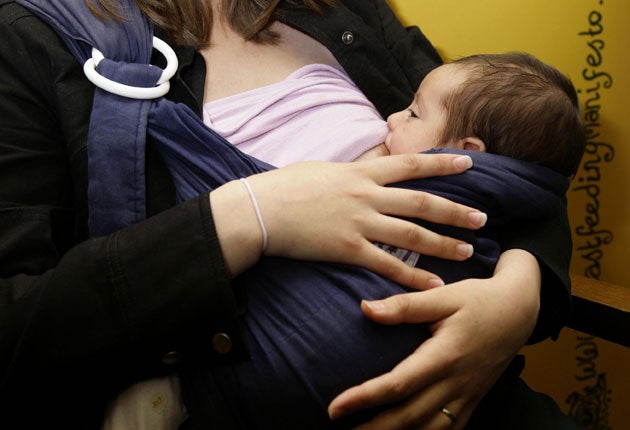Campaigners livid as Whitehall axes Breastfeeding Week
Critics say move may undo years of work, just as message on benefits of mothers' milk gets through

Your support helps us to tell the story
From reproductive rights to climate change to Big Tech, The Independent is on the ground when the story is developing. Whether it's investigating the financials of Elon Musk's pro-Trump PAC or producing our latest documentary, 'The A Word', which shines a light on the American women fighting for reproductive rights, we know how important it is to parse out the facts from the messaging.
At such a critical moment in US history, we need reporters on the ground. Your donation allows us to keep sending journalists to speak to both sides of the story.
The Independent is trusted by Americans across the entire political spectrum. And unlike many other quality news outlets, we choose not to lock Americans out of our reporting and analysis with paywalls. We believe quality journalism should be available to everyone, paid for by those who can afford it.
Your support makes all the difference."Breast is best" is the simple message healthcare providers like to drum into new mothers' exhausted brains. Their jobs will get a little harder this year after the Government controversially axed its support for National Breastfeeding Week, which was due to run next month.
Campaigners last night warned that the move, which will save just a few hundred thousand pounds, risked undoing years of good work just at a time when the message on the benefits of breast milk were starting to get through.
The decision means there will be no UK-wide campaign to remind parents that breastfeeding is the easiest way to give your baby a head start. The latest research, released earlier this month, revealed that breastfed babies are less likely to have behavioural problems by the age of five than those given formula milk.
The Royal College of Midwives (RCM) said it was "disappointed" by the U-turn, which increases pressure on local support groups to step in instead. Janet Fyle, the RCM's professional policy adviser, said a national campaign "galvanises everybody, from professionals to mother-to-mother groups". She warned: "It is not cost effective to drop something with which you have had some success. The Government needs to look at all the very good work that it has done to generate interest in breastfeeding, and the help that support groups have received."
Belinda Phipps, chief executive of the National Childbirth Trust, a charity that supports new mothers, called the Government's move "frustrating". She said mums wanted to breastfeed but often found they struggled because they lacked support. She called for "better training" for midwives and more support for organisations such as the NCT, which has its own training scheme for breastfeeding counsellors.
"The evidence of the health benefits of breastfeeding is unequivocal. But as a society we have a funny attitude towards breastfeeding because breasts are used for sex, so I can see why [promoting breastfeeding] is not a total win-win for government," Ms Phipps added.
Although the latest infant feeding survey, due out shortly, is expected to show a slight increase in the numbers of women breastfeeding, it remains a contentious issue. World Health Organization recommendations state that mothers should exclusively breastfeed their babies until they are six months old, but existing figures show that barely a third of British babies are exclusively breastfed at one week and just a fifth at six weeks. By the time babies are four months old, the figures plunge to 7 per cent, giving the UK one of the worst breastfeeding records in the developed world.
Campaigns have featured the likes of Nell McAndrew, the glamour model, who breastfed her son well into toddlerhood. The year that McAndrew fronted National Breastfeeding Week, a third of mothers from C2DE backgrounds said that seeing her extol the virtues of breast milk had made them think more positively about it.
The Department of Health yesterday defended its decision. A spokesperson said it valued work being done by other organisations to promote breastfeeding, adding: "During this transition phase, we will be considering how infant nutrition will be delivered to support better health outcomes."
Among those stepping into the breach is the retailer Mothercare, which intends to team up with the RCM to host in-store advice clinics for new mothers during what would have been National Breastfeeding Week, from 19 to 25 June. The NCT will also be running special events.
Join our commenting forum
Join thought-provoking conversations, follow other Independent readers and see their replies
Comments